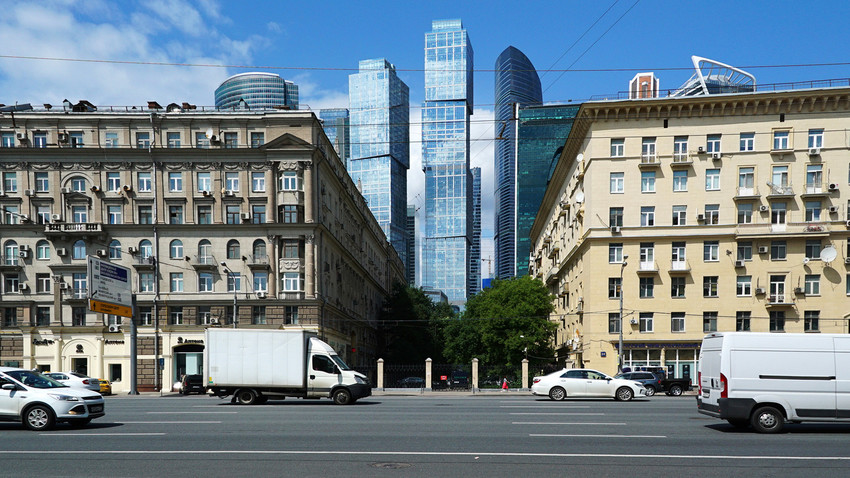
A view of Kutuzovsky Avenue and the Moscow City internationational business centre from Dunayevskogo Street.
Konstantin Leyfer/TASS1. Know the market price
The main thing when renting an apartment in Moscow, or in any other Russian city, is not to overpay. Some landlords may succumb to temptation and charge unreasonably high prices at the peak of the tourist inflow into the Motherland.
Learn a little about market pricing at any given period via open websites where Russians post rental ads: CIAN, Avito, and Reality.Yandex may help. Booking and Airbnb are friendlier for non-Russian speakers and exclude any conversations with landlords or real estate agents prior to your arrival.
As of March, you may book an apartment in Moscow for the first week of June in the range of $50 (3,000 rubles) to $500 (30,000) rubles per night. The closer to the center, the higher the price tag. Renting a similar apartment for a whole month would be considerably more expensive than renting for short periods.
2. Rent for days, not months
Renting for shorter periods is much easier and will spare you unnecessary troubles. Landlords tend to charge higher prices for shorter periods, but this option frees you from putting down a large deposit, and the landlord will also cover utilities. Plus, the whole process will be easier to go through.
3. Book in advance to get a good price
If a landlord or a real estate agent says there is no better option on the market, he is playing games. Plenty of apartments are available for rent in Moscow and other host cities, and there will be many places to choose from. The sooner you secure a place to stay, the better. However, prices are likely to rise as fans arrive to see The 2018 FIFA World Cup Russia™.
Start scrolling through online databases and you’ll easily nail a nice place for a reasonable price.
4. Contract first, money second
It’s very important that you sign a contract with your landlord. Paying an unknown person without signing a contract puts you at risk of losing money to fraudsters or irresponsible landlords. A contract should be simple, and usually takes only two pages, stipulating basic provisions along with personal details of the owner and the tenant. Compare the information in the contract with an actual ID of the person who signs it on the landlord's behalf.
Before signing a contract, look through the apartment with regard to any possible damage done by a previous tenant. If you note anything serious (like a hole in the ceiling, or a damaged plasma TV), document it with photos and make the owner sign a supplement to the contract; the supplement may even be handwritten.
5. Pay electronically
When everything is done and the contract is signed, wire money to the owner’s bank account. It’s quite likely that you’ll be asked to pay in cash, but it never hurts to request transferring money electronically. If your landlord refuses to accept anything but cash, pay in cash but make sure he writes you a receipt. Again, it may even be a handwritten receipt stating the amount paid, the purpose of payment, terms of rent and the date.
Remember, pay for only what you’ve agreed to when booking the apartment online and nothing extra. All the taxes, utilities, and any other expenses are on the landlord, full stop.
Landlords and agents acting on their behalf always ask for a deposit (up to $100 or 6,000 rubles). Pay the money, but make sure the sum is clearly stated in the contract so that you get the money back when leaving; (assuming you did not damage the apartment).
Sign the papers, pay, get the key and unpack. In general, you should only see your landlord again on departure day. But make sure you have his or her phone number in case of any emergency.
Read everything you need to know about The 2018 FIFA World Cup Russia™ in this ultimate guide.
If using any of Russia Beyond's content, partly or in full, always provide an active hyperlink to the original material.
Subscribe
to our newsletter!
Get the week's best stories straight to your inbox